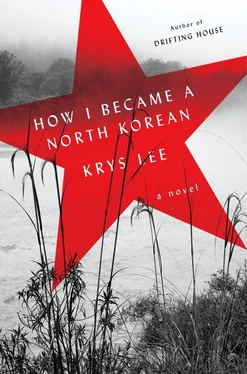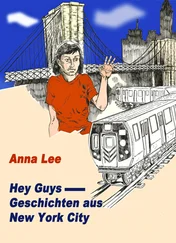I didn’t know what a bank account was yet. The loneliness of the new geography, and language, my new body that demanded sleep day and night, overwhelmed me. I began to cry. It wasn’t hard to cry as I thought of my baby and how much we needed Seongsik. Need. I wanted to be free from it. The body that demanded food and shelter, that traded safety for sex, how pregnancy weakened it, all of this disgusted me. To be free of your body’s needs, I thought, that is true freedom.
He covered his ears with his hands. “Don’t cry,” he said. “You don’t deserve to cry!”
As if someone had pressed a button, my tears stopped. I pressed a cool glass of water across my cheek. “Who’s crying?”
He tallied up all my betrayals and pounded his palm with a balled-up fist. When I tried to hold him from behind by the waist and calm him, he threatened to report me to a North Korean official that he said he was secretly friends with. Then he cried and said, “I’m sorry. I’m so sorry.”
I was relieved when he left the next morning to guide some Christian tourists. But as the tension stitched into my body began to ease, around noon the doorknob turned and someone called out shrilly, “You! You North Korean girl!”
The voice pricked me. It was his eomeoni, who had let herself into the apartment with a spare key. As soon as I greeted her, the doughy-faced woman grabbed me by the hair and yanked me toward the door. The burning went tingling down to my knees, and I just managed to stay on my feet.
“You witch! How dare you stay here!” She let go of my hair. “You don’t deserve my son. I’m tempted to call security and ship you straight to a repatriation center.”
Terror quickened my heart and a flash of guilt was swallowed up by more terror. How could a woman with child survive alone in this country?
“Eomeoneem.” I lowered myself to my knees, enraged and afraid. “Eomeoneem, I have nowhere to go. I’m so sorry. I had no choice.”
“Don’t soil the word eomeoni on your lips. Get work in another city or something, anything.” She shivered. “How do you expect my son to look at you anymore?”
“If you want me gone so badly, you could send me to Nam — South Korea.” I said it quietly. “I hear they give you resettlement money and I will repay you, I promise. You will be doing a good thing, saving two lives.”
That was the wrong thing to say.
She tugged at the front of my shirt with her strong, veiny hands until my shirtsleeve ripped. A button popped off. Her bun came loose and her hair hovered like a thatched roof above her shoulders.
“That’s what you always wanted, wasn’t it? I won’t see my son abused this way.”
My hands went to protect my stomach. My ears were ringing when I said, “No, he married me. I’m his wife. The past is the past — I can explain. I had to survive.”
“I don’t want to hear it! You’re not his wife. You’re a North Korean, you’re nothing.”
She pulled her purse open so quickly that she tore the zipper. As my baby moved inside me, I vowed to bear it all and wait until Seongsik returned. He would fix the situation. With time I could make him love me again. I told myself this before she withdrew a handful of yuan and threw it at me.
“Take it before I change my mind.”
I tried to follow her into the kitchen, but my legs wouldn’t support me. She came back with a bag heavy with what she said was food.
“Take what’s here. It’s more than you deserve.”
“Please, you don’t know what I’ve lost to get here! I’ll be a better wife to him than you could ever hope for.”
I continued to beg. I considered beating her head in with a heavy pan.
Byeol was at her piano lesson. If she had been at home, maybe she would have pleaded for me, maybe the possibility of yet another new woman in her life would have finally driven her to me. But she wasn’t there and I was as alone as ever.
“You forced us to this,” she said. “I want you gone before my son gets home. If you don’t leave now, I’ll call right now and report suspicious behavior in the apartment complex and have you sent back. They don’t care, as long as vermin like you are gone. Is that what you want?”
“Think of my innocent baby.” I backed up against the bookcase. “And your son, your son will get in trouble.”
“I am thinking about my poor son.” She crossed her arms, her legs spread out broadly beneath her long skirt. “There are ways. I promise you, there are ways.”
What choice did I have? I took what I could carry and left.
• • •
I stuck close to the side of the apartment complex, avoiding the eyes of suspicious strangers, passed the towering telephone poles plastered with advertisements. I was no longer anyone’s wife, or a North Korean, or a Jangmi. That’s what I believed. Only a stranger with a sack of food bulky under her coat.
I walked away from the building. Just then a patrol car pulled into the parking lot and I had a brief view of two men in dark green uniforms before I swiveled back around the side of the building, concealing myself. The cigarettes between their fingers, their relaxed demeanor, made them look so ordinary. That was the way it was with these men who casually destroyed lives after a cigarette.
The time it took to pass the apartment’s security camera felt like a crawl. Slow, slow, I told myself. But once my feet were out of the camera’s range and far from the officers, I dropped the heavy sack of food and broke into a run. I was terrified and couldn’t stop. I slowed only as the fog rolled in. I had never been so unprepared. The fog erased the people, the buildings, erased everything, until I could have been anywhere and anyone. It was the perfect weather for thieves. And lovers.
Under the safety of darkness I found a street of my country’s restaurants that Seongsik had pointed out on our first drive in. I saw a few bowls, plates, and chopsticks strewn across green plastic tables in the window of one eatery. The floating islands of leftover noodles and rice they held, all that waste, still shocked me. There were two tin signs, one in Chinese and one in our language, and inside, laminated photos of food were taped to the wall. Its drabness had more in common with my hometown than with the dazzling Chinese cities I had seen on television.
There was also a woman alone. She stretched out her bare feet from under the table and wiggled her fingers in the air with an ease I envied. I pressed close enough that my reflection disappeared. Someday I would be like this woman in her own eatery, surrounded by all that couldn’t be taken away. There would be my child beside me in a sunflower print dress, who would never know cold or hunger or suffering. There would be no denouncements, no fear, only my baby girl’s feet tapping and the endless sun that would never set. I saw it through the window, the vision that sustained me: my future.
The woman rose and began counting her cash. Her heavier lower half billowed out in a flowery skirt and white pantaloons underneath, and her bucolic shuffle contrasted with the industry of her quick hands. She reminded me of my mother.
I entered into the amber light.
“Please.”
I gestured at the bowl of half-eaten noodles on one of the creaky plastic tables. I wanted to save Seongsik’s mother’s money, the little I had.
“I just want something — anything — to eat and then I’ll go.”
The woman’s eyes met mine and became unfriendly. “You’re from across the river?” she said. Whatever kindness in her was gone.
“What you have left over, anything.”
“You people,” the woman said, and again I was struck by the feeling that I was no longer a person, but one of many, to her. “After you beg for free food and clothes, you’re always coming over and stealing eggs and rice from the same people who helped you. A whole cow disappeared in the next town. And now you want my noodles.”
Читать дальше












